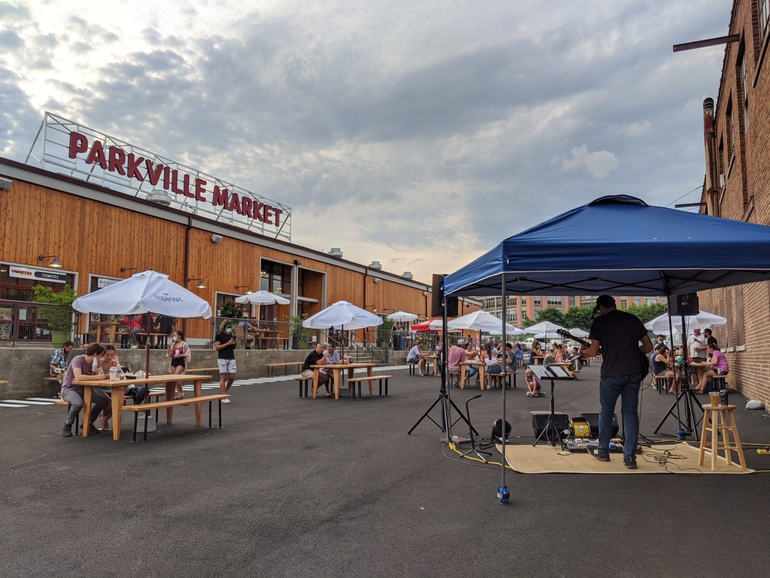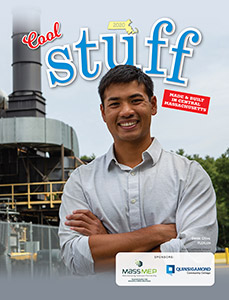From expanding Hartford’s Parkville Market to establishing an advanced manufacturing hub in the city, plans are under way to spend nearly $800 million in Connecticut economic development funds expected from President Biden’s American Rescue Plan Act pandemic relief package.
“As Connecticut recovers, it’s clear that an investment needs to be made to ensure that our businesses can survive, that they can grow and that all members of society can access development opportunities throughout our state,” said state budget chief Melissa McCaw, who recently outlined Gov. Ned Lamont’s proposal for deploying the stimulus funds.

Most of the $2.6 billion due to Connecticut as direct relief in Biden’s package would go to help balance the state’s budget under Lamont’s plan. But $350 million of federal money bolstered by $480 million in state borrowing and tax credits were set aside for workforce development and major projects to boost job and business creation.
The governor’s plan was awaiting approval by the legislature as of press time. Agency heads are also awaiting specific direction from the U.S. Treasury Department on restrictions on the use of the aid funds.
But even as they wait, state officials are already envisioning using the funds for building an innovation and economy-boosting “ecosystem” in the state around green technology. The pandemic aid could help the state replicate its success in helping to attract, grow and expand biotechnology firms in Connecticut even as traditional sectors like insurance have stagnated.
Innovating for the future
Sparking and supporting innovative ideas is a theme for economic growth plans both at the city and state level.
In Hartford, Mayor Luke Bronin drew up a list of projects he would fund with the city’s portion of the American Rescue Plan Act money, with $4 million for expanding Parkville Market near the top of the list. The market, pitched as the state’s first big city-style food hall, has drawn crowds and rave reviews and filled its vendor roster even under pandemic restrictions.

“The Parkville Market has been one of the great success stories of this past year,” Bronin said. “There’s an opportunity to help expand upon that success and grow what’s been built down there.”
Parkville Market developer Carlos Mouta said he would start a second phase this year as soon as the funds come through. Plans include a brewery and tap room with a rooftop event space, along with a standalone restaurant in a nearby building once home to a daycare center.
Bronin said he also hopes federal funds can make a longer-term contribution to Hartford’s economy in supporting insurtech, digital health and advanced manufacturing startups. Proposed allocations by the mayor include $500,000 for an “Innovation Ecosystem” project and $450,000 for the city’s Tourism & Visitors Bureau.
“It is very much a part of our community’s recovery from this very devastating year,” Bronin said of the American Rescue Plan funding. “We need to make investments that create jobs and support entrepreneurs.”
Finding innovative ways to market the city and state as destinations is top of mind for Mike Freimuth, executive director of the Capital Region Development Authority (CRDA). Hotels, restaurants and the event industry in Hartford have been decimated and regional tourism could restore some vitality, he added.

“What we’re hopeful for on the economic development side is some assistance to the travel and tourism industry,” Freimuth said. In addition, at least $5 million of the aid funds under the governor’s plan would go toward sustaining the Hartford area’s major venues, the XL Center and Connecticut Convention Center and returning them to post-pandemic service. Recovery for the two venues is at least two years away, depending on trends in corporate travel, Freimuth said.
Transformational projects
New Haven’s success with the pharmaceutical industry and projects like the new 101 College Street biotech building (a soon-to-be-built 500,000-square-foot office tower that recently signed Arvinas as a lead tenant) inform the state’s plans to turbo-charge greentech in the state, said David Lehman, commissioner of the Department of Economic and Community Development (DECD) and Lamont’s senior economic advisor.
“That is a potential game changer in terms of accelerating job creation in the region and ultimately in the state,” Lehman said of 101 College. “We need more density in our cities for these hubs of entrepreneurship and creativity. That’s what we need more of in the state.”
Lamont’s team seeks to use the federal aid money to create an “Innovation Corridor” in the state linking tech hubs like 101 College and others, Lehman said. Once the governor’s proposal is approved, DECD will start seeking ideas and additional funding for projects across the state.

“There’s lots of potential ideas,” Lehman said. “We really want the private sector to be at the table — we don’t want the state dictating what the projects should be. We actually want the state helping catalyze it but really filling in the capital structure, not driving it.”
Other aspects of the governor’s proposal hit on themes of transit-oriented development, worker retraining and equity, including the creation of a “Future Fund” that will set aside 50% of $150 million for businesses owned by women and minorities.
The potential of sustainability is the focus of another key element, a “Greentech Fund” fueled by $50 million in federal funds plus $150 million from the private sector with the goal of creating at least 2,000 jobs. The intellectual property coming out of Connecticut’s universities like Yale and UConn can help fuel a greentech boom in the state in areas like battery technology and recycling, Lehman said.
“This is an industry we need to lean on more and we think it’s more important for the future,” Lehman said. The governor’s pledge for the state to go carbon-neutral by 2040 can help spark development, he added.
Ecosystem tests commercial potential
Pending moves by regulators could set the stage for an “innovation ecosystem” in greentech that expedites the development of new technologies, said Bryan Garcia, president and CEO of the Connecticut Green Bank. The Public Utilities Regulatory Authority is considering a plan that would allow new technologies to be tested by utility companies and their residential, commercial and industrial customers.
“To the extent that the technologies coming through this program can demonstrate the benefit to those end-use customers through pilots, those technologies can be scaled up for market,” Garcia said.
The Green Bank plans to allocate some of the federal relief funding toward programs helping energy customers modernize and become more efficient in their usage. It will also work with Connecticut Innovations on commercializing green technology in its role as a commercial lender.
“It’s important that we take measurable risk and try to realize the future gains from the green economy locally,” Garcia said. He added that Connecticut’s Green Bank served as a model for the Biden administration’s $27 billion Clean Energy and Sustainability Accelerator program.
“That’s where a small state punching above its weight creates an example for the nation for how state and local government can mobilize private investment and build out the green economy,” Garcia said.
Banking on past successes
Connecticut Innovations, the state’s quasi-public venture capital arm, is slated to play a key role in administering both the Innovation Corridor and greentech investment efforts, said CEO Matthew McCooe.

“We’ve done really well with the Connecticut Bioscience Innovation Fund — the seeds that we planted there have taken root,” McCooe said. “It’s time for us to expand and look at other categories where we can have a similar impact. We have successes to build upon.”
Promising opportunities in the green space include technology around Vineyard Wind and other wind-energy projects, along with fuel cells and green chemistry. That sector is already showing promise: Enko, a green agrotech company, recently moved from Massachusetts to open a new headquarters and research facilities in Mystic.
Companies that want access to the federal relief in the form of venture capital should connect with Connecticut Innovations or local accelerators now to position themselves for the coming cash, McCooe said.
“Approach us, start a conversation,” McCooe said. “That’s why we’re here.”



